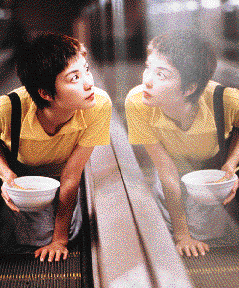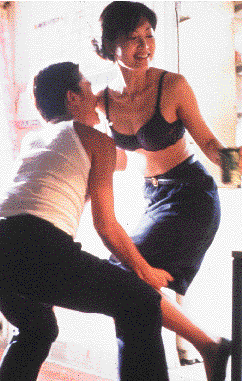HOLLYWOOD'S ASIAN STRATEGY
Page 2 of 7
 o the question arises: If a confluence of Asian money alone is not
sufficient to redirect Hollywood's priorities and prevailing Asian strategies,
what is? Invariably, the magical equation must include two other key factors
around which Hollywood economics and politics have always revolved: talent
and markets.
o the question arises: If a confluence of Asian money alone is not
sufficient to redirect Hollywood's priorities and prevailing Asian strategies,
what is? Invariably, the magical equation must include two other key factors
around which Hollywood economics and politics have always revolved: talent
and markets.
| "To that market, names like Sylvester Stallone and Harrison Ford don't mean anything. To that market, the name Jackie Chan means everything. And the name Chow Yun-Fat means a lot." |
It would be too easy, of course, to attribute Hollywood's surging interest in China to purely economic factors. Where Deng Xiaoping's economic reforms in the 1980s made the Chinese market attractive to American film companies, the concurrent emergence of the Fifth Generation and the New Hong Kong Cinema made it positively irresistible. After all, even the largest market in the world would be hard-pressed to capture Hollywood's attention without a pre-existing infrastructure for cinema. What the Fifth Generation/Hong Kong combination provided, however, was far more than that. Exemplifying the two aesthetic extremes of Asian filmmaking, they proved to Hollywood, and to the world, that Asian filmmakers could be both artistically brilliant and commercial.
While directors like Zhang Yimou and Chen Kaige, the so-called Fifth Generation of Beijing Film Academy graduates, were busy winning international awards with films like Yellow Earth, Red Sorghum and Raise the Red Lantern, Hong Kong artisans like Jackie Chan and crime film director John Woo were pioneering a braver, brasher kind of crowd-pleasing action film than the poorly-dubbed, technically raw efforts of the Bruce Lee era. More importantly, Hong Kong's new style of filmmaking was gaining popularity throughout Asia in general and--despite the better efforts of censors--throughout the mainland in particular.
"Here is a market that is some 30% of the world's population and American films have almost no exposure there except on the fringes in bootleg cassettes," observes Los Angeles-based film critic and noted Asian film expert Andy Klein. "To that market, names like Sylvester Stallone and Harrison Ford don't mean anything. To that market, the name Jackie Chan means everything. And the name Chow Yun-Fat means a lot."
A long-time evangelist for the merits of Hong Kong cinema, Klein revels in the overdue Hollywood success of stars like Chan and Chow, along with directors like John Woo, Tsui Hark and Ringo Lam. He acknowledges, though, that there's more to their stateside success than a seeming recognition of Hong Kong cinema. "It's not just a matter of seeing great talent. It's a matter of seeing this talent that comes with a built-in audience which we are highly covetous of. It clearly behooves us to establish relationships with those stars who are going to carry a great deal of weight in that marketplace."
In hindsight, the Hollywood-Hong Kong connection would appear to have been inevitable. Of all the world's indigenous film industries, none is more akin to Hollywood than Hong Kong. Both are the products of intensely competitive, capitalistic societies that exalt the very commercial appeal at which more traditional societies often balk, even while their populations stampede to patronize Hollywood films. In the view of producer Janet Yang, a veteran of Hollywood-Chinese relations on both sides of the Pacific and former president of Oliver Stone's Ixtlan Films, Hong Kong talent also reassures Hollywood's need for efficiency, stability and longevity, elements crucial to success in a region known for its resistance to rapid change.
"I think there's a difference between any other film 'wave' and Hong Kong movies," she says. "Hong Kong movies aren't as much a wave as they are commercial. They are, for the most part, action movies. Many of the directors who are being signed now by Hollywood agencies are extremely adept at making films quickly and cheaply, yet with tremendous commercial appeal. They play to a wider audience. And action movies have always been a staple of the industry."
So relentless has been the clamor to attract Hong Kong talent to Hollywood that many seem to have forgotten the difficulty that Hong Kong filmmakers faced throughout the '80s as they tried to shed the image of the '70s and call the world's attention to their revitalized industry; sustained in America by a small but loyal cult following of both Caucasian and Asian Americans who often traveled as far as a hundred miles to find the nearest Chinatown theater.
So what finally made the difference?
It was New Line Cinema's release of Jackie Chan's Rumble in the Bronx.
"That was the definite benchmark," says Yang, "80% of the Asian directors who were signed by Hollywood agencies were signed after Rumble in the Bronx. And it's not like people hadn't heard of the Hong Kong directors and weren't wooing them, but Rumble clinched the deal."


Maverick Hong Kong filmmaker Wong Kar-Wai's Chungking Express proved a bona fide hit, earning him a solid American following and stirring interest in his previous cult classics.
Indeed, the recent signings of Hong Kong directors read like a veritable "brain drain" of the best the small, proud industry has to offer: Ringo Lam, Tsui Hark, Kirk Wong, Stanley Tong and Ronnie Yu to name only a few. Even the great King Hu, considered the godfather of the modern Hong Kong film, has a Hollywood project in the works. "John Woo is always complaining about not feeling at home," jokes one observer. "He won't be able to say that anymore."
One can't overestimate the effect of the successes of Jackie Chan and John Woo in breaking down Hollywood's racial and cultural barriers. Chan's two earlier Hollywood efforts were met with negligible returns, but Rumble provided an opportunity to return on his own terms and prove that his Hollywood failures were not the result of any lack of talent or appeal, but simple studio ineptitude.
"Bob Shaye, who founded New Line Cinema, has always been a fan of Hong Kong Cinema," points out Mark Ordesky, executive vice president of acquisitions and co-productions, who helped broker the Rumble deal. "In the old days, [he] used to be big on Bruce Lee films, but continually got outbid. So we always tracked Jackie Chan's films and when Rumble opened far larger in Asia, that really struck me. Then, when we saw it, we knew we had to have it."
"Jackie Chan movies were sitting in warehouses for years and years and years," adds Yang. "They couldn't give them away. This year at the American Film Market, buyers were crawling all over themselves to get at them. And they wouldn't leave the room until they had a deal."
The coming months, in fact, will present American audiences with a Jackie Chan onslaught the likes of which even Hong Kong has never seen. On the heels of Rumble in the Bronx and the current American release of 1992's Supercop, Miramax will soon release old favorites like Drunken Master II and Crime Story while New Line Cinema will handle the three post-Rumble productions: Thunderbolt, First Strike and A Nice Guy.
Still, if luring the likes of Jackie and John Woo to Hollywood is part of some Asian Strategy, Hollywood has yet to capitalize on it. All of Chan's films are still Hong Kong productions and he has no apparent plans to make a film stateside. There are rumors, though, of a possible parting with Golden Harvest, his longtime production company, and of a collaboration with Wesley Snipes in Confucius Jones. PAGE 3
| Page 1 | 2 | 3 | 4 | 5 | 6 | 7 |
CONTACT US
|
ADVERTISING INFO
© 1996-2013 Asian Media Group Inc
No part of the contents of this site may be reproduced without prior written permission.
